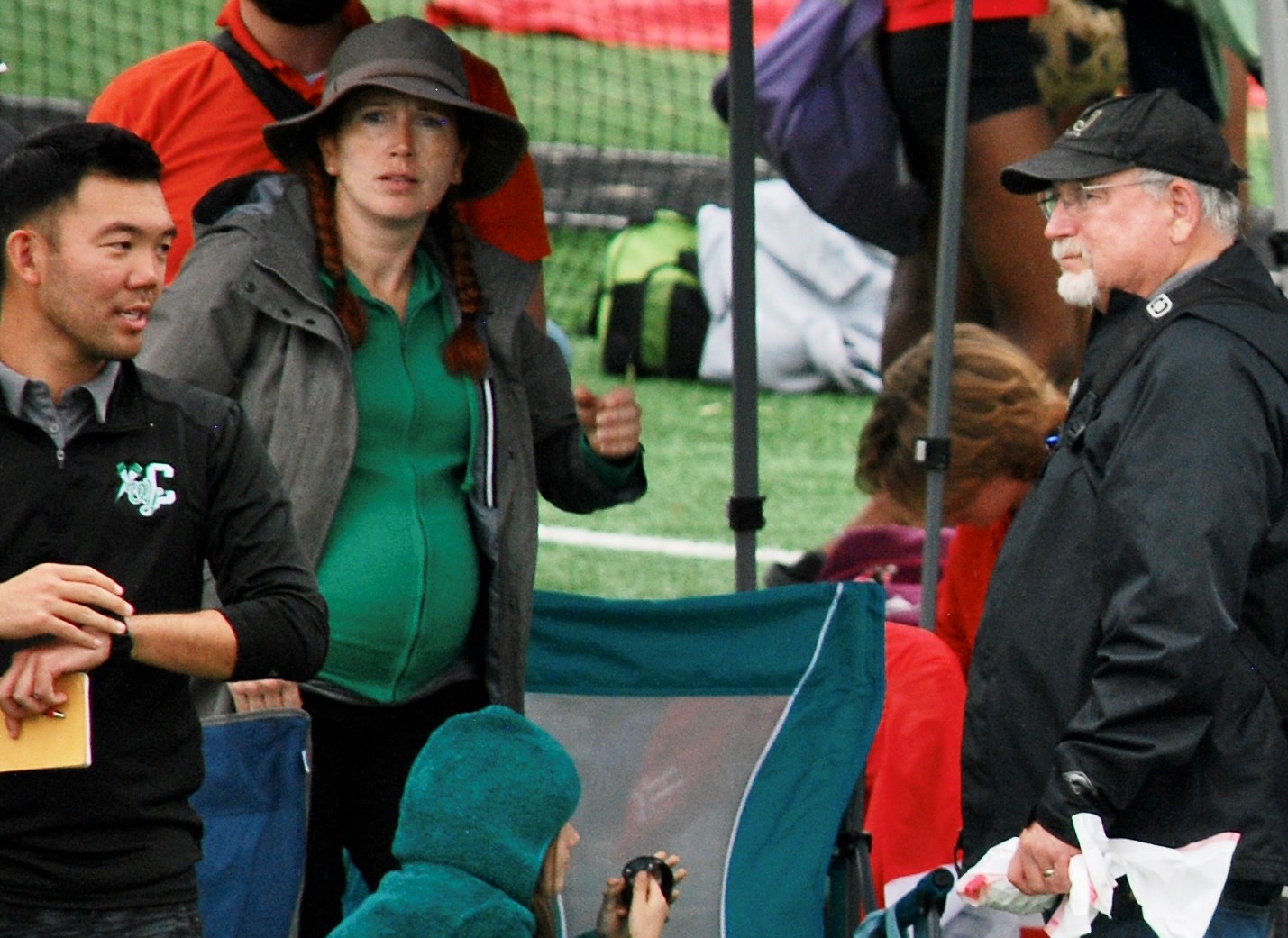Running along the C&O Canal Towpath last fall, Dan Meteer bumped into Arlingtonians Mike Crozier and Clint McKelvey. Typically a solo runner, Meteer joined them, and listened to the two discuss a friend’s marathon training.
By Meteer’s retelling, they expressed skepticism their friend was running enough to help him break 2:19 and qualify him for the Olympic Marathon Trials. Approaching his own debut marathon at California International a few months later, Meteer, 24, was eager to hear their opinions, then horrified.
“I’m just like oh god, they’re basically talking about me,” he said. “I decided, ‘screw it, I’m going to run 100 miles a week.'”
It was a risky move for a guy who spent most of five years at Brown going from injury to injury, still new to having consecutive months’ worth of training. But the gamble paid off, and he ran 2:17:43 in his first marathon.
All of Meteer’s history suggested that much mileage would be a disaster. As a soccer team castoff at Arlington High School in Massachusetts, he showed enough talent that his coaches knew they couldn’t do much for him, so they directed him to a local private coach.
“I feel like a lot private coaches make their money by saying they have some secret to training,” Meteer said. “This guy was no different. He basically told me that if I ran any sort of mileage, I’d break.”
So he succeeded on weeks of 15-20 miles, enough to get him recruited to run at Brown. Throughout his five years in college, he cycled through a torn labrum, three stress fractures in his right hip, two stress fractures in his sacrum, two in his right femoral neck,one in his public bone and that stress reaction in his ankle.
“The doctors at school told me I was basically made of glass and I shouldn’t bother anymore,” he said. “Luckily, I didn’t care what they thought.”
He was able to find a champion in former Stanford star Adam Tenforde, now a doctor in Boston, who diagnosed Meteer’s low bone density; By comparison, Meteer’s grandfather had healthier bones. For six months, Meteer had to inject himself with a low-grade thyroid medication that would promote increased bone density.
At the same time, Brown hired a trainer who had worked at the University of Oregon and had some more running-specific experience, so Meteer started to see a little more support as he worked his way back.
All told, he didn’t race for nearly two years. He managed a few good races in his fifth year, but frustration often took over when he widened the scope of his seasons.
“I’d go from the workout of my life to the worst 3k I’d ever run,” he said. “I never thought about quitting when I was injured, but the bad races were more frustrating. I’m staying around an extra year and this is all I had to show for it.”
After graduation, shortly after he dropped out of his conference 10,000 meter championship, he looked ahead to his professional life with a new outlook.
“I didn’t see myself running seriously after college,” he said. “I flirted with the idea, but I didn’t take it very far before I knew I wanted to do something else.”
He didn’t quit. When the natural end to his running career presented itself, he took it. Two days after he graduated, he was off to Teach for America training, and then his placement in New Orleans. Before long, though, he was running again, albeit at a more relaxed pace.
“Training was mentally grueling and running was an efficient way to exercise and clear my mind,” he said. “I guess I was running a lot — about 60 miles a week — for a guy who said he wasn’t running anymore.”
Running became more of a salve as he felt the pressure of teaching an underserved population against the teaching experience he lacked. So he quit. After six months, he was done and moved to D.C. to live with his girlfriend. They later moved to Arlington.
“Teach for America looks for recruits with resiliency traits — people who would never identify as a quitter, people whose worldview would be crushed if they ever quit anything,” Meteer said. “I’ve broken a bunch of bones, they thought I’d never quit. Luckily for me, that was isolated to the sport of running.”
Without a job, he stuck with running as something to do and a way to meet people. He joined the Georgetown Running Club, and spent his first practice running with two-time Olympic Trials qualifier Kieran O’Connor. Meteer lasted for 10 of O’Connor’s 800 meter intervals. He was already looking forward to his own qualifying race.
“I didn’t really have the same goals from when I was running in college,” Meteer said. “I wasn’t going to qualify for nationals in 5k or 10k, so the Olympic Trials just seemed like the right goal.
“I told myself I would run seriously until I qualified for the trials or it became apparent that by either age, talent or injury proneness I wasn’t going to make it.”
He envisioned it as an epic poem.
“I figured I’d chase my 5k PR, my 10k PR…run a few halves,” he said. “Years would pass and I would run a couple of marathons and then finally on my third or fourth try, I’d figure it out and make it.”
But graduating college in 2018 and spending the rest of the year figuring things out shortened his timeline if he wanted to race in 2020.
“I’d better try now,” he said.
Despite his fatigue with interval training and his protests that he wasn’t really that fast, he ran 4:09.31 for the 1600 meter leg of the Millrose Games distance medley relay, helping GRC finish second, a race Meteer viewed as a way to make a good impression.
His track season out of the way, Meteer raced the Rock ‘n’ Roll D.C. Half Marathon in 1:07:33 for fifth place, then 50:22 for second place at the George Washington Parkway Classic, behind O’Connor.
“That felt like my real introduction to road racing,” Meteer said. “We had four guys racing for three prize money spots.”
He started doing longer runs, largely picking from friends’ marathon workouts while battling the summer humidity. He worked on his overall running fitness during GRC interval workouts, but didn’t impress himself there.
“When I look at my Wednesday workouts, they’re incredibly pedestrian compared to stuff I did in college,” Meteer said. “In college, coaches are very in control of everything – you’re a robot. In the post-collegiate world, everyone is an adult and does different things. If I feel bad in a workout, I just tell coach ‘that’s it for me,’ and go home.”
Though he faced the ticking clock of the Marathon Trials qualifying window, it wasn’t nearly as loud as his collegiate eligibility.
He won the Annapolis 10 Mile before running a miserably hard race at the Genworth Virginia 10 Mile in Lynchburg.
Georgetown Running Club Coach Jerry Alexander felt the Virginia 10 Miler was worth more than Meteer gave credit.
“When you look at marathon training, where you’re trying to hit certain times, it’s refreshing to get in a good effort and just race,” he said.
It also prompted Meteer to add the Indianapolis Monumental Half Marathon to his schedule. Though he wasn’t trying to run the 1:04 half marathon qualifying time, he came away with a 1:04:53 finish time. Those 100-mile weeks he ran? Three came in the month before the race and one followed it.
“To run that kind of time with that workload gave him a lot of confidence, and that’s what he had been missing,” Alexander said. “He believed in himself after Indy, and that’s what you need in the last weeks before a marathon.”
Indeed, that made the prospect of running 5:18s more attainable for Meteer. He’d need to run that pace to qualify for the Trials.
“It was a big turning point,” he said. “I wasn’t going to go across the country to race if I didn’t think I could do it. Some people can do that, but where I am right now, I needed to know.”
The California International Marathon’s Dec. 8 race date gave Meteer the most time he could reasonably take to train and also recover for the Feb. 29 Trials. It also showed him hundreds of runners trying for the same goal at the same place.
“It was a spectacle, and it was so cool,” he said. “The pace group was huge. I’d never been in a race like that before.”
At mile 11, he looked around and decided nobody he was running with seemed to be comfortable enough to continue running that fast for 15 more miles.
“It was totally baseless, but I just decided I had to move up,” he said. “I knew I could handle a fast mile.”
After hitting the halfway mark in 1:09:03, he settled into 5:15 pace and held himself together even as his legs started to deteriorate at mile 19.
“I was hurting, but I wasn’t slowing down,” he said. “I was too excited to slow down.”
As he crossed the 25th mile mark, he felt like his body exploded, but he kept running.
“I knew no matter what, I could keep going at that point,” he said.
With a 1:17 margin, he ran in his first marathon what he imagined would take several tries. He also had less than three months to do it again. After a 10-day Runspringa, he was back to a more disciplined approach to training.
After running the fast Sacramento course, he’s looking forward to the hillier Olympic Trials course in Atlanta. It may play to his advantage.
“I’m glad the course will be bad, because the people who have had a long time to prepare might feel a little more confident, they’ll be a little more aggressive and they’ll flame out like in 2016 (in the Los Angeles heat),” he said. “The people who qualified at CIM and Houston were more conservative.”
Alexander sees the top 50 as a possibility for Meteer.
“He has nothing to lose,” Alexander said. “There was nothing in his college career to suggest he’d be running under 2:18 so soon, so there’s no telling what else he can do, but I think something good’s going to happen when he gets out there.
“He’s a marathoner, no doubt.”
Recent Stories
Looking for our race calendar? Click here Submit races here or shop local for running gear
Zebra Dazzle 5k Walk/Run or 100 Bike over 30 Days
Join the Zebras for this Zebra Dazzle event for all fitness levels. The 5k Walk/Run has 2 options. You can participate as an onsite participant on 9/13 at Carter Barron in Rock Creek Park, NW Washington DC or as a
Hero Dogs 5K9
Hero Dogs Inc will host its 5th Annual 5K9 race at the Congressional Cemetery on Saturday, May 17th, beginning at 8 am. There will also be a 1K Fun Run. The 1K Fun Run will start at 8 am sharp






